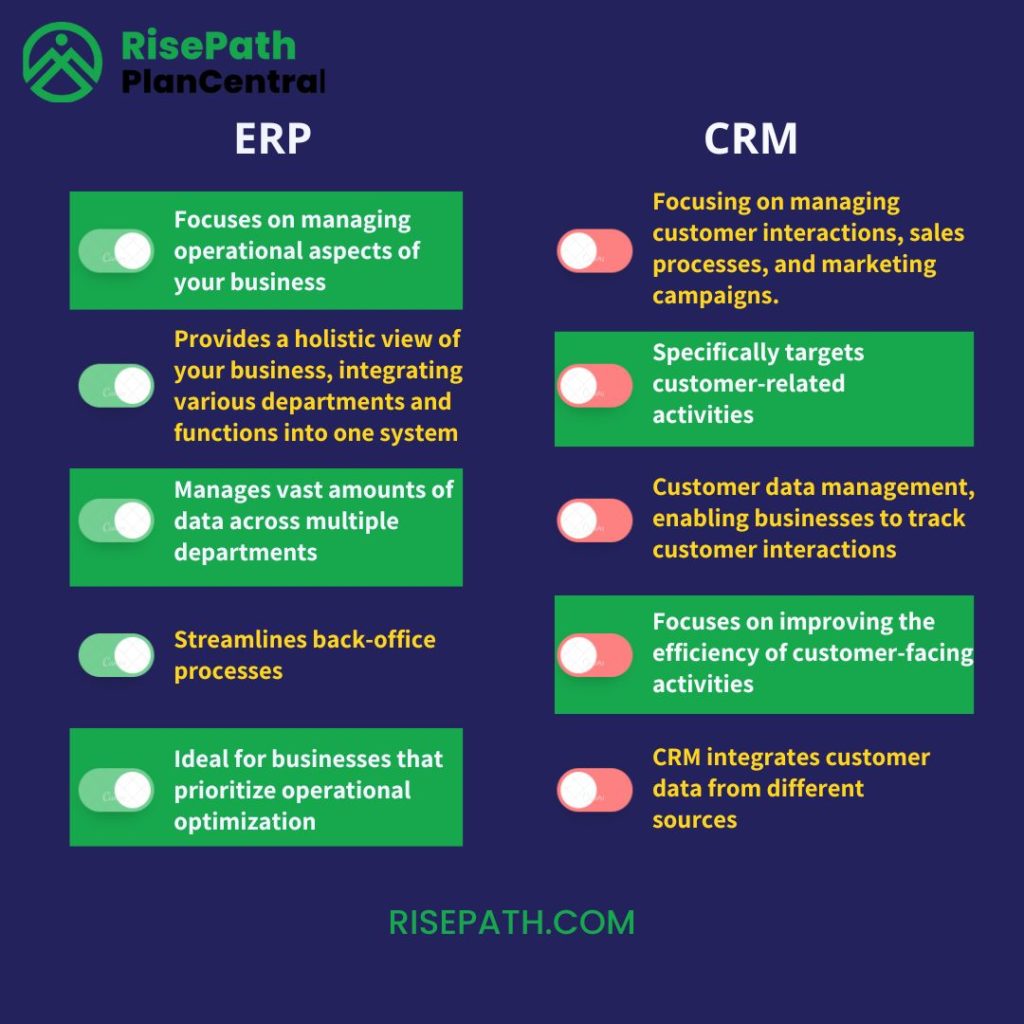ERP, CRM, and HR systems are powerful tools that can transform the way businesses operate. To delve deeper into their benefits and differences, let’s explore each system in more detail.
Enterprise Resource Planning (ERP) System: ERP systems are designed to integrate and streamline core business processes, making them ideal for industries such as manufacturing, distribution, retail, and education. These systems encompass various modules that handle specific functions, including accounting, manufacturing, sales, human resources, and more.
One of the primary advantages of ERP is improved efficiency and productivity. By automating manual tasks and providing real-time visibility into operations, ERP systems eliminate redundant processes and streamline workflows. This leads to time savings, reduced errors, and increased overall productivity.
Also Read: The Importance of quality leads
Cost reduction is another key benefit of ERP. With better inventory control, optimized procurement processes, and streamlined financial management, businesses can minimize wastage and optimize resource allocation. Additionally, centralized data management enables accurate forecasting and informed decision-making, which further contributes to cost savings.

ERP systems also empower businesses to make data-driven decisions. By consolidating data from different departments, such as finance, sales, and manufacturing, ERP provides a comprehensive overview of the business. This enables managers to identify trends, spot opportunities, and address potential issues promptly.
Furthermore, ERP systems enhance customer satisfaction by facilitating smooth order processing, timely delivery, and effective customer support. With integrated CRM functionality, businesses can manage customer relationships more efficiently and tailor their interactions to individual preferences and needs.
Customer Relationship Management (CRM) System: CRM systems are designed to manage customer interactions and improve overall customer relationship management. They track customer data from various sources, including marketing campaigns, social media, and sales channels. This data is then analyzed to improve sales, marketing, and customer support processes.
The primary advantage of CRM is improved customer service. By capturing and analyzing customer data, businesses gain valuable insights into customer preferences, behavior, and history. This enables personalized interactions, targeted marketing campaigns, and proactive customer support, all of which contribute to enhanced customer satisfaction.
CRM systems also drive increased sales by facilitating efficient lead management and sales pipeline tracking. Through lead scoring and segmentation, businesses can prioritize leads and focus their efforts on high-potential opportunities. Additionally, CRM provides comprehensive visibility into the sales process, enabling effective collaboration among sales teams and efficient sales forecasting.
Another advantage of CRM is the ability to build stronger customer relationships. By leveraging customer data, businesses can identify opportunities for upselling, cross-selling, and personalized recommendations. Furthermore, CRM enables effective customer retention strategies by nurturing existing relationships and identifying customer churn indicators.
Human Resources (HR) System: HR systems are designed to manage employee-related tasks, including employee information, payroll, benefits, performance reviews, and compliance with labor laws. These systems streamline HR processes and improve overall workforce management.
One of the key benefits of HR systems is compliance with labor laws and regulations. By automating HR processes, businesses can ensure accurate record-keeping, maintain up-to-date employee information, and generate reports required for legal compliance. This reduces the risk of penalties and legal issues.
HR systems also optimize employee benefits administration, ensuring accurate payroll processing, efficient benefits enrollment, and timely leave management. By automating these processes, businesses can minimize errors and improve employee satisfaction.
Furthermore, HR systems facilitate improved employee performance management. Through performance reviews, goal tracking, and training management, businesses can provide feedback, identify skill gaps, and offer development opportunities to enhance employee performance and engagement.
Integration and Interdependence: While ERP, CRM, and HR systems have distinct focuses, they are interdependent and can benefit from integration. Integration between ERP and CRM systems allows for a seamless flow of information, enabling a holistic view of customer data across departments. This integration enables better decision-making, personalized customer interactions, and improved sales forecasting.
Similarly, integrating HR systems with ERP and CRM systems allows businesses to align employee information with customer data. This integration enables HR departments to access accurate employee data, such as sales performance and customer interactions, to make informed decisions regarding compensation, performance evaluation, and training opportunities.
Moreover, integrating all three systems—ERP, CRM, and HR—provides comprehensive data visibility and enables cross-functional collaboration. Sales teams can leverage ERP data to better understand inventory availability and streamline order fulfillment, while HR departments can utilize CRM data to align recruitment efforts with customer demand.
The decision of which system to implement—or whether to adopt a combination of ERP, CRM, and HR—depends on the specific needs and goals of the business. Consider the following factors when making your decision:
- Industry and Business Focus: Assess the core operations of your business and identify which system aligns best with your industry and business requirements. For example, manufacturing companies may prioritize an ERP system to optimize production and supply chain management, while customer-centric businesses may prioritize CRM to enhance customer relationships and sales.
- Business Scale: Consider the size of your business and its growth trajectory. ERP systems are often favored by larger organizations with complex operations, while CRM systems can benefit businesses of all sizes, particularly those with a strong focus on customer interactions. HR systems, on the other hand, are essential for managing employee data and compliance regardless of business scale.
- Specific Business Objectives: Identify your key business objectives and determine which system or combination of systems will help you achieve them. If your priority is operational efficiency and process automation, ERP may be the right choice. If your focus is on improving customer relationships and increasing sales, CRM should be a priority. If effective workforce management and compliance are your goals, an HR system is crucial.
- Integration Capabilities: Evaluate the compatibility and integration capabilities of different software solutions. Seamless integration between systems allows for efficient data flow and a unified view of business operations. Assess the ability to integrate ERP, CRM, and HR systems, as well as the availability of third-party integration tools if needed.
- Budget and Resources: Consider the financial investment required for each system, including implementation, training, and ongoing support costs. Determine whether your business has the resources and expertise to implement and maintain the chosen system(s) effectively. For some businesses, a phased approach, starting with a single system and gradually incorporating others, may be more feasible.
In conclusion, ERP, CRM, and HR systems play distinct yet interconnected roles in managing and optimizing various aspects of a business. Understanding the benefits and differences between these systems is crucial for making informed decisions that align with your business objectives and needs. By selecting the right combination of systems and integrating them effectively, businesses can enhance operational efficiency, improve customer relationships, and optimize workforce management, ultimately driving growth and success.
For more information and a free informational ebook, please add your contact info. Thanks.

Comments are closed, but trackbacks and pingbacks are open.